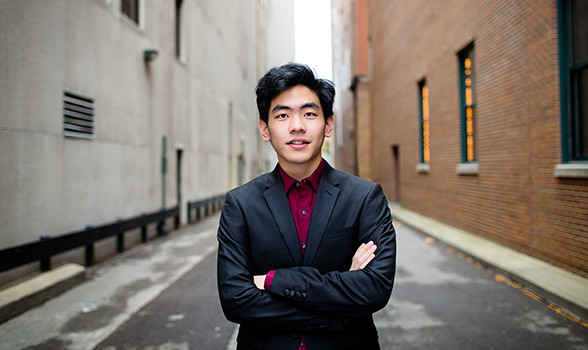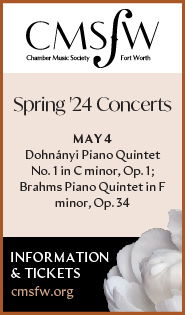Cliburn Semifinal: Round 1

Daniel Hsu
An explosive fortissimo double octave provided the dramatic opening for the semifinal round of the 2017 Cliburn Piano Competition Thursday evening, and set a surprisingly bold tone for 19-year-old American pianist Daniel Hsu’s recital performance. That striking opening occurs at the beginning of a set of Four Impromptus (Op.90, D.899) by Schubert, in which Hsu stretched this early romantic music as far as it could go on the modern concert grand.
The intensity of the opening exclamation continued throughout the first of the four movements, along with an impressive balance of the lyrical melodic lines with the potentially troublesome accompaniment lines in this movement. Hsu pushed the second of the four Impromptus, a fluid Allegro, into a Presto, creating more drama—albeit sacrificing some of the movement’s songlike lyricism—before closing the movement with a forceful (and unauthorized) accelerando. In the floating serenity of the third movement, a well-known Andante in G flat, showed off a delicate command of voicing, as well as an assertive but effective rubato. In the final item in this set, a whistful Alegretto in A flat, Hsu again proved his lightness of touch in that familiar, whispy, descending arpeggio.
Hsu opened his second and final work, Brahms’ hefty Variations and Fugue on a Theme of Handel, briskly enough, with the jaunty baroque theme providing a quick and effective contrast to the preceding Schubert. This monumental structure presents an obstacle course of technical challenges, with each of twenty-five variations presenting a specific technical trial, capped off by an equally formidable fugue. While wrestling with each variation, the pianist must, to produce an effective performance, build and maintain a convincing momentum.
And, while Hsu proved equal to the obvious technical demands, he failed to find the variety needed within each variation to create that sense of forward motion. An occasionally heavy foot on the pedal likewise slowed the impetus—even while tempos remained impressively quick—resulting in the sense that one was, at times, listening to a set of technical exercises.

Dasol Kim
South Korean Dasol Kim, 28, a student of Ari Vardi at the Hochschule fur Musik in Hannover, took a completely different approach in his performance of Schubert’s Sonata in B-flat (D. 960) as well as in Mendelssohn’s Fantasie in F-sharp Minor. In the Mendelssohn work, with which he opened his program, Kim provided much more subtle—and ultimately more effective—command of structure. While the tone of this succinct, three-movement work is largely dark, the textures are light; Kim achieved the perfect balance of those two elements here.
The Schubert B-flat Minor Sonata, meanwhile, provides the daunting challenge of generally delicate material stretched over a monumental four-movement structure. Rather than regaling the jury and audience with thunder and virtuosity, Kim patiently explored Schubert’s treasury of ideas, for an impressive, highly artistic reading.
Between the Mendelssohn and Schubert, Kim provided a sharp and appealing contrast with one of only two works by living composers to appear in the semi-final round, the Etude No. 7 (“Intermezzo”) by Russian composer Nikolai Kapustin. Kim pulled off the jazzy, often beautifully lyrical moments in this work handily.



Posted Jun 03, 2017 at 5:05 pm by George Fee
In Schubert op.90 #2 , Henle ,and every other edition I recall having seen , has “accelerando” at bar 267 .I do not ever recall hearing a performance which does not contain at least some accelerando at this spot.